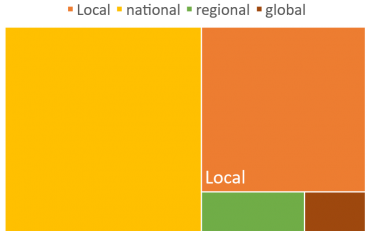-> Download here the report and the PowerPoint presentation showing the preliminary results of the first Global Survey on DPO Participation in Development Programmes and Policies – December 2018 to January 2019!
BACKGROUND
In recent years, new commitments to include persons with disabilities have been taken by governments, the UN and funding agencies through the 2030 Agenda, the 2018 Global Disability Summit or the recent UN Disability Inclusive Strategy.
With these commitments come the urgency of ensuring that persons with disabilities are represented in decision-making, in line with a rights-based approach, to guide orientations in line with article 4.3 of the CRPD. With these commitments comes a new phase of advocacy for the disability rights movement to monitor that pledges to leave no one behind effectively translate into laws, policies and programmes advancing our rights.
The IDA Global Survey is a tool to measure that we are on the right track, to check what is the reality of consultation of DPOs, how do governments, the UN or funding agencies engage them and at which stages of the policy or programme cycle.
With financial support of the Ministry for Foreign Affairs of Finland and the UK Department for International Development and technical support from the Assistive Living and Learning (ALL) Institute, Maynooth University, Ireland, the International Disability Alliance launched on December 2018 a unique global survey by and for the disability rights movement to take the pulse of DPO perceptions on their participation in shaping development policies and programmes.
PRELIMINARY RESULTS – THE FIRST GLOBAL SURVEY TO TRACK DPO PARTICIPATION IN DEVELOPMENT PROGRAMMES AND POLICIES
573 DPOs across 165 countries responded to a questionnaire developed in English plain language disseminated online in Arabic, Chinese, English, French, Russian, Spanish and International Sign.
Respondent DPOs represented a wide range of constituencies among persons with disabilities, with a majority of them being active at the national or local level.
While IDA is still analyzing the data, preliminary findings from the report provide new evidence to characterize participation of DPOs:
- When asked to compare with one year ago, respondents perceive that their involvement and influence is improving, which suggests that the global momentum on inclusion of persons with disabilities is somewhat impacting levels of participation of representative organizations.
- However, overall DPOs are more displeased (45.6%) than pleased (31.0%) with their engagement with their government.
- Preliminary analysis also suggests that some groups are less represented than others in consultations with government, UN and funding agencies. Persons with visual impairments, physical impairments and hearing impairments are considered to have more access than persons with intellectual disabilities, persons with deafblindness or indigenous persons with disabilities.
- A majority of DPOs also reports that they are never invited to take part in influential stages of the policy or programme cycle such as budget decisions.
- Barriers remain significant to ensure persons with disabilities can take part with their government, with only 25% of DPOs reporting they mobilise resources to ensure DPOs can participate, less than 17% reporting that attitudes and knowledge are fully supportive of their participation, and about 8% reporting full accessibility of venues and of information and communication.
While further analysis is underway, IDA will establish with this initial Global Survey a baseline with evidence against which progress will be measured every two years.

->Download here the report and the PowerPoint presentation showing the preliminary results of the first Global Survey on DPO Participation in Development Programmes and Policies – December 2018 to January 2019!
For more information on the survey:
- Web page hosting information related to the launch of the first Global Survey on DPO Participation in Development Programmes and Policies – December 2018 to January 2019
- Web page where all the information related to this year’s and next Global Surveys will be hosted

